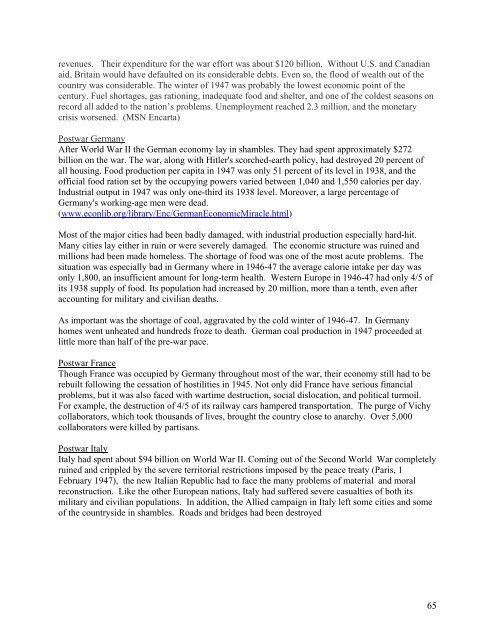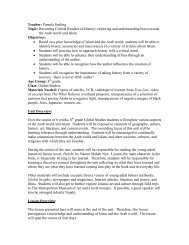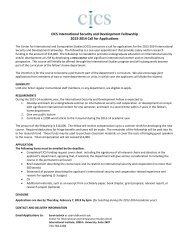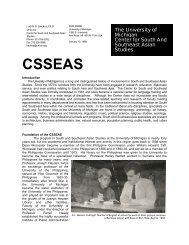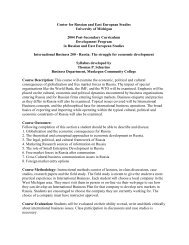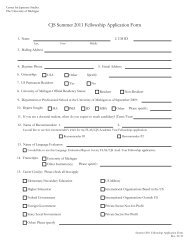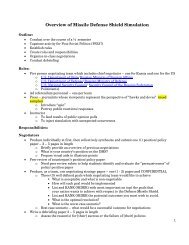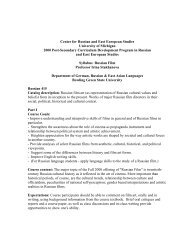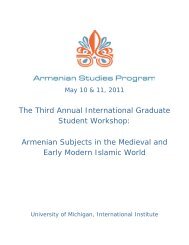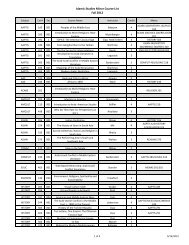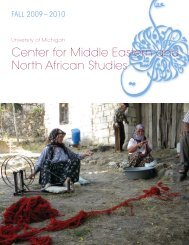Muslims in Europe: - International Institute - University of Michigan
Muslims in Europe: - International Institute - University of Michigan
Muslims in Europe: - International Institute - University of Michigan
Create successful ePaper yourself
Turn your PDF publications into a flip-book with our unique Google optimized e-Paper software.
evenues. Their expenditure for the war effort was about $120 billion. Without U.S. and Canadian<br />
aid, Brita<strong>in</strong> would have defaulted on its considerable debts. Even so, the flood <strong>of</strong> wealth out <strong>of</strong> the<br />
country was considerable. The w<strong>in</strong>ter <strong>of</strong> 1947 was probably the lowest economic po<strong>in</strong>t <strong>of</strong> the<br />
century. Fuel shortages, gas ration<strong>in</strong>g, <strong>in</strong>adequate food and shelter, and one <strong>of</strong> the coldest seasons on<br />
record all added to the nation’s problems. Unemployment reached 2.3 million, and the monetary<br />
crisis worsened. (MSN Encarta)<br />
Postwar Germany<br />
After World War II the German economy lay <strong>in</strong> shambles. They had spent approximately $272<br />
billion on the war. The war, along with Hitler's scorched-earth policy, had destroyed 20 percent <strong>of</strong><br />
all hous<strong>in</strong>g. Food production per capita <strong>in</strong> 1947 was only 51 percent <strong>of</strong> its level <strong>in</strong> 1938, and the<br />
<strong>of</strong>ficial food ration set by the occupy<strong>in</strong>g powers varied between 1,040 and 1,550 calories per day.<br />
Industrial output <strong>in</strong> 1947 was only one-third its 1938 level. Moreover, a large percentage <strong>of</strong><br />
Germany's work<strong>in</strong>g-age men were dead.<br />
(www.econlib.org/library/Enc/GermanEconomicMiracle.html)<br />
Most <strong>of</strong> the major cities had been badly damaged, with <strong>in</strong>dustrial production especially hard-hit.<br />
Many cities lay either <strong>in</strong> ru<strong>in</strong> or were severely damaged. The economic structure was ru<strong>in</strong>ed and<br />
millions had been made homeless. The shortage <strong>of</strong> food was one <strong>of</strong> the most acute problems. The<br />
situation was especially bad <strong>in</strong> Germany where <strong>in</strong> 1946-47 the average calorie <strong>in</strong>take per day was<br />
only 1,800, an <strong>in</strong>sufficient amount for long-term health. Western <strong>Europe</strong> <strong>in</strong> 1946-47 had only 4/5 <strong>of</strong><br />
its 1938 supply <strong>of</strong> food. Its population had <strong>in</strong>creased by 20 million, more than a tenth, even after<br />
account<strong>in</strong>g for military and civilian deaths.<br />
As important was the shortage <strong>of</strong> coal, aggravated by the cold w<strong>in</strong>ter <strong>of</strong> 1946-47. In Germany<br />
homes went unheated and hundreds froze to death. German coal production <strong>in</strong> 1947 proceeded at<br />
little more than half <strong>of</strong> the pre-war pace.<br />
Postwar France<br />
Though France was occupied by Germany throughout most <strong>of</strong> the war, their economy still had to be<br />
rebuilt follow<strong>in</strong>g the cessation <strong>of</strong> hostilities <strong>in</strong> 1945. Not only did France have serious f<strong>in</strong>ancial<br />
problems, but it was also faced with wartime destruction, social dislocation, and political turmoil.<br />
For example, the destruction <strong>of</strong> 4/5 <strong>of</strong> its railway cars hampered transportation. The purge <strong>of</strong> Vichy<br />
collaborators, which took thousands <strong>of</strong> lives, brought the country close to anarchy. Over 5,000<br />
collaborators were killed by partisans.<br />
Postwar Italy<br />
Italy had spent about $94 billion on World War II. Com<strong>in</strong>g out <strong>of</strong> the Second World War completely<br />
ru<strong>in</strong>ed and crippled by the severe territorial restrictions imposed by the peace treaty (Paris, 1<br />
February 1947), the new Italian Republic had to face the many problems <strong>of</strong> material and moral<br />
reconstruction. Like the other <strong>Europe</strong>an nations, Italy had suffered severe casualties <strong>of</strong> both its<br />
military and civilian populations. In addition, the Allied campaign <strong>in</strong> Italy left some cities and some<br />
<strong>of</strong> the countryside <strong>in</strong> shambles. Roads and bridges had been destroyed<br />
65


